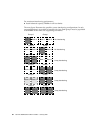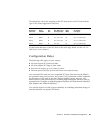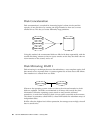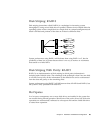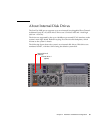
84 Sun Fire 280R Server Owner’s Guide • January 2001
About Peripheral Component
Interconnect (PCI) Buses
All system communication between the CPU/memory subsystem and all external
devices, network interfaces and internal storage/removable media is handled by the
host-bus to PCI-bridge application specific integrated circuit (ASIC). This bridge
ASIC manages communication between the system bus and the two PCI buses.
These PCI buses support slots for up to four PCI interface cards. One PCI bus (bus
A) also handles communication between the system and the on-board Fibre
Channel-Arbitrated Loop (FC-AL) controller for the internal drives and the external
high-speed serial data connector (HSSDC). The other PCI bus (bus B) handles
communication between the system and the main logic board’s SCSI controller,
Ethernet controller, Universal Serial Bus (USB) controller, and serial and parallel port
controller.
PCI cards are available in a variety of configurations. Not all cards will fit or operate
in all PCI slots, so it is important to know the specifications of your PCI cards and
the types of cards supported by each PCI slot in the system.
Some PCI cards are as short as 6.875 inches (17.46 cm) in length (called “short”
cards), while the maximum length of PCI cards is 12.28 inches (31.19 cm, called
“long” cards). Each slot in the system can accommodate either a long or a short card.
Older PCI cards communicate over 32-bit PCI buses, while many newer cards
communicate over wider 64-bit buses. All four of the PCI slots accept either 32-bit or
64-bit wide cards.
Older PCI cards operate at 5 VDC, while newer cards are designed to operate on
3.3 VDC. Cards that require 5 volts will not operate in 3.3-volt slots, and 3.3-volt
cards will not operate in 5-volt slots. “Universal” PCI cards are designed to operate
on either 3.3 volts or 5 volts, so these cards can be inserted into either type of slot.
The system provides three slots for 5-volt cards and one slot for a 3.3-volt card.
All four PCI slots accept universal cards.
Most PCI cards operate at clock speeds of 33 MHz, while some newer cards operate
at 66 MHz. All four PCI slots can accept 33-MHz cards. 66-MHz cards are restricted
to the slot labeled PCI 1.









